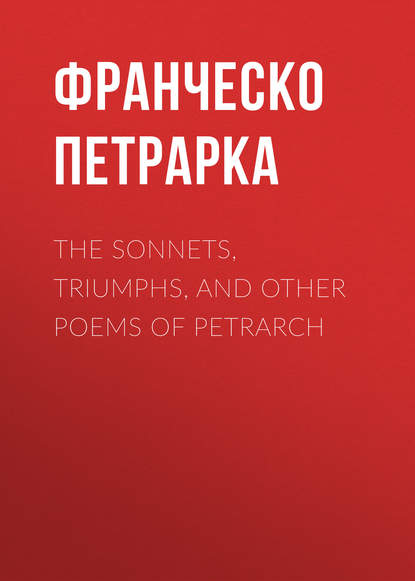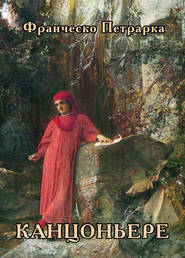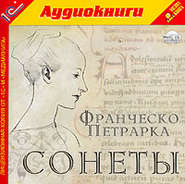По всем вопросам обращайтесь на: info@litportal.ru
(©) 2003-2025.
✖
The Sonnets, Triumphs, and Other Poems of Petrarch
Настройки чтения
Размер шрифта
Высота строк
Поля
And there, as gold in fire full fined to each intent,
Charged with fear, and terror eke I did myself present,
As one that doubted death, and yet did justice crave,
And thus began t' unfold my cause in hope some help to have.
"Madam, in tender youth I enter'd first this reign,
Where other sweet I never felt, than grief and great disdain;
And eke so sundry kinds of torments did endure.
As life I loathed, and death desired my cursèd case to cure;
And thus my woeful days unto this hour have pass'd
In smoky sighs and scalding tears, my wearied life to waste;
O Lord! what graces great I fled, and eke refused
To serve this cruel crafty Sire that doubtless trust abused."
"What wit can use such words to argue and debate,
What tongue express the full effect of mine unhappy state;
What hand with pen can paint t' uncipher this deceit;
What heart so hard that would not yield that once hath seen his bate;
What great and grievous wrongs, what threats of ill success,
What single sweet, mingled with mass of double bitterness.
With what unpleasant pangs, with what an hoard of pains,
Hath he acquainted my green years by his false pleasant trains."
"Who by resistless power hath forced me sue his dance,
That if I be not much abused had found much better
And when I most resolved to lead most quiet life, chance;
He spoil'd me of discordless state, and thrust me in truceless strife.
He hath bewitch'd me so that God the less I served,
And due respect unto myself the further from me swerv'd;
He hath the love of one so painted in my thought,
That other thing I can none mind, nor care for as I ought.
And all this comes from him, both counsel and the cause.
That whet my young desire so much to th' honour of his laws."
Harington MS.
SONNET LXXXII
Dicemi spesso il mio fidato speglio
HE AWAKES TO A CONVICTION OF THE NEAR APPROACH OF DEATH
My faithful mirror oft to me has told—
My weary spirit and my shrivell'd skin
My failing powers to prove it all begin—
"Deceive thyself no longer, thou art old."
Man is in all by Nature best controll'd,
And if with her we struggle, time creeps in;
At the sad truth, on fire as waters win,
A long and heavy sleep is off me roll'd;
And I see clearly our vain life depart,
That more than once our being cannot be:
Her voice sounds ever in my inmost heart.
Who now from her fair earthly frame is free:
She walk'd the world so peerless and alone,
Its fame and lustre all with her are flown.
Macgregor.
The mirror'd friend—my changing form hath read.
My every power's incipient decay—
My wearied soul—alike, in warning say
"Thyself no more deceive, thy youth hath fled."
'Tis ever best to be by Nature led,
We strive with her, and Death makes us his prey;
At that dread thought, as flames the waters stay,
The dream is gone my life hath sadly fed.
I wake to feel how soon existence flies:
Once known, 'tis gone, and never to return.
Still vibrates in my heart the thrilling tone
Of her, who now her beauteous shrine defies:
But she, who here to rival, none could learn,
Hath robb'd her sex, and with its fame hath flown.
Wollaston.
SONNET LXXXIII
Volo con l' ali de' pensieri al cielo
HE SEEMS TO BE WITH HER IN HEAVEN
So often on the wings of thought I fly
Up to heaven's blissful seats, that I appear
As one of those whose treasure is lodged there,
The rent veil of mortality thrown by.
A pleasing chillness thrills my heart, while I
Listen to her voice, who bids me paleness wear—
"Ah! now, my friend, I love thee, now revere,
For changed thy face, thy manners," doth she cry.
She leads me to her Lord: and then I bow,
Preferring humble prayer, He would allow
That I his glorious face, and hers might see.
Thus He replies: "Thy destiny's secure;
To stay some twenty, or some ten years more,
Is but a little space, though long it seems to thee."
Nott.
SONNET LXXXIV
Charged with fear, and terror eke I did myself present,
As one that doubted death, and yet did justice crave,
And thus began t' unfold my cause in hope some help to have.
"Madam, in tender youth I enter'd first this reign,
Where other sweet I never felt, than grief and great disdain;
And eke so sundry kinds of torments did endure.
As life I loathed, and death desired my cursèd case to cure;
And thus my woeful days unto this hour have pass'd
In smoky sighs and scalding tears, my wearied life to waste;
O Lord! what graces great I fled, and eke refused
To serve this cruel crafty Sire that doubtless trust abused."
"What wit can use such words to argue and debate,
What tongue express the full effect of mine unhappy state;
What hand with pen can paint t' uncipher this deceit;
What heart so hard that would not yield that once hath seen his bate;
What great and grievous wrongs, what threats of ill success,
What single sweet, mingled with mass of double bitterness.
With what unpleasant pangs, with what an hoard of pains,
Hath he acquainted my green years by his false pleasant trains."
"Who by resistless power hath forced me sue his dance,
That if I be not much abused had found much better
And when I most resolved to lead most quiet life, chance;
He spoil'd me of discordless state, and thrust me in truceless strife.
He hath bewitch'd me so that God the less I served,
And due respect unto myself the further from me swerv'd;
He hath the love of one so painted in my thought,
That other thing I can none mind, nor care for as I ought.
And all this comes from him, both counsel and the cause.
That whet my young desire so much to th' honour of his laws."
Harington MS.
SONNET LXXXII
Dicemi spesso il mio fidato speglio
HE AWAKES TO A CONVICTION OF THE NEAR APPROACH OF DEATH
My faithful mirror oft to me has told—
My weary spirit and my shrivell'd skin
My failing powers to prove it all begin—
"Deceive thyself no longer, thou art old."
Man is in all by Nature best controll'd,
And if with her we struggle, time creeps in;
At the sad truth, on fire as waters win,
A long and heavy sleep is off me roll'd;
And I see clearly our vain life depart,
That more than once our being cannot be:
Her voice sounds ever in my inmost heart.
Who now from her fair earthly frame is free:
She walk'd the world so peerless and alone,
Its fame and lustre all with her are flown.
Macgregor.
The mirror'd friend—my changing form hath read.
My every power's incipient decay—
My wearied soul—alike, in warning say
"Thyself no more deceive, thy youth hath fled."
'Tis ever best to be by Nature led,
We strive with her, and Death makes us his prey;
At that dread thought, as flames the waters stay,
The dream is gone my life hath sadly fed.
I wake to feel how soon existence flies:
Once known, 'tis gone, and never to return.
Still vibrates in my heart the thrilling tone
Of her, who now her beauteous shrine defies:
But she, who here to rival, none could learn,
Hath robb'd her sex, and with its fame hath flown.
Wollaston.
SONNET LXXXIII
Volo con l' ali de' pensieri al cielo
HE SEEMS TO BE WITH HER IN HEAVEN
So often on the wings of thought I fly
Up to heaven's blissful seats, that I appear
As one of those whose treasure is lodged there,
The rent veil of mortality thrown by.
A pleasing chillness thrills my heart, while I
Listen to her voice, who bids me paleness wear—
"Ah! now, my friend, I love thee, now revere,
For changed thy face, thy manners," doth she cry.
She leads me to her Lord: and then I bow,
Preferring humble prayer, He would allow
That I his glorious face, and hers might see.
Thus He replies: "Thy destiny's secure;
To stay some twenty, or some ten years more,
Is but a little space, though long it seems to thee."
Nott.
SONNET LXXXIV














